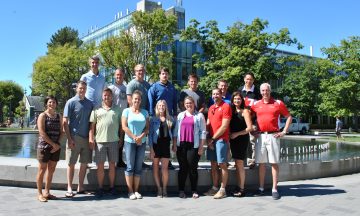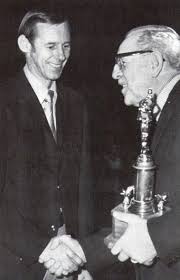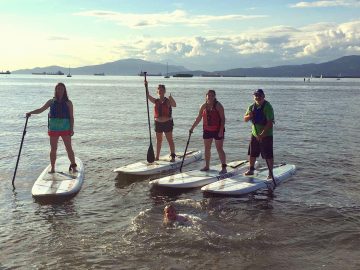Running group helps half its graduates quit
Sept. 13, 2017 – “Joining a running group can help you quite smoking. That’s the conclusion of a new UBC study that found that half the people who completed a 10-week program were able to successfully quit smoking.” Read more here.
Graduate Certificate in High Performance Coaching & Technical Leadership
Congratulations to the 13 graduate students who received their Graduate Certificates in High Performance Coaching and Technical Leadership (HPC&TL) on Monday, August 28, 2017.

The HPC&TL is a one-year, 12 credit specialized program for experienced elite sport coaches and technical leaders. This online program offers development of skills in analysis and evidence-based decision-making: it is designed to help develop the next generation of coaches and technical leaders for Canada. The students will now go on to complete their Masters.
Maria Gallo, Instructor, and Director of Masters of High Performance Coaching & Technical Leadership explains, “This very applied year has provided them with a strong foundation to progress into their Masters. The strength of this cohort is their diversity and impact they will have in the Canadian Sport System.”
New Paper Out
Aug. 22, 2017 – New paper out by Dr. Guy Faulkner examining access to alcohol and tobacco around school and its relation to odds of cigarette smoking and binge-drinking among Ontario high school students. Read it here!
Haggarty, Cait
Cait Haggarty, a Victoria native and 2008 UBC Kinesiology graduate, has the distinction of being an integral member of three Canadian champion UBC basketball teams.
While playing for coach Deb Huband, Cait was a record-setting guard on Thunderbird teams who won CIS national titles in 2004, 2006 and 2008, a rare feat indeed. As of 2017 she still holds UBC’s record for most assists in a Canada West season. She was a three-time Academic All Canadian as well as Thunderbird co-captain during her final two seasons. Cait also served as the team’s assistant coach in 2009-2010 and 2012-2013. In the words of coach Huband, “Cait made an indelible mark during her university days at UBC . . . (her) drive to excel and commitment to team was demonstrated daily through her work ethic, commitment to excellence and team comradery.”
Following UBC Haggerty earned her Masters Degree in Education in Intercollegiate Athletic Leadership from the University of Washington while working as a graduate assistant with the women’s basketball team. More recently Cait has worked as a personal trainer and has completed the Fire Fighter Technologies Certificate Program.
In 2017 it was announced Cait will be the new head coach of the Camosun College women’s basketball team of the Pacwest Conference. Responding to Cait’s recent appointment coach Huband said (she) “ . . . undoubtedly will take her passion, knowledge and work ethic to face the challenge of building a championship basketball program.”
Fred Hume, August 2017
Upson, Brian
The late Brian Upson was a stellar Thunderbird basketball player in the early 1950s and a 1953 graduate of Physical Education now referred to as Kinesiology. However, Brian is best remembered as a high school basketball coach, in fact a storied career which stands out among such careers of those from UBC.

Photograph By Bill Cunningham photo.
Upon graduating from UBC Upson taught and coached at West Vancouver high school for nearly 30 years until his untimely passing in 1982. But a story still told to this day was when the gravely ill Upson coached his West Van team to the BC High School championship – a first for a North Shore school – an exciting 49 – 48 victory in what is considered by many as the most unforgettable title game in the tournament’s history.
It was the evening of March 20, 1982 that Upson, thin and gaunt yet gamely battling cancer, was cheered at the conclusion of the final game by a huge crowd of emotionally drained fans, both teams applauded for their efforts but especially for those of this one individual. By this time Upson, in a great deal of pain and defying his medical team, was confined to a wheelchair but discarded it when coaching from the bench. Unbelievably he was even able to stand for the tournament’s entire closing ceremonies. It was a competition between life and death.
According to his assistant coach “ . . . when he went home the night we won, he never got out of bed again . . . he died two weeks to the day after the final game.” A memorable event which in 2016 became the movie documentary “Long Shot” teaching us of will, endurance and courage.
Fred Hume, August 2017
Farewell SUPing Lab Outing
Aug. 18, 2017 – A successful evening of SUPing with the Pop-PA Lab to say farewell to our research coordinator, Meghan O’Neill.
We will miss you – good luck in grad school!
BCHL turning to app to help detect concussions in young players
This is an excerpt from an article that was originally published at cbc.ca on August 16, 2017. Read the full text here.
The British Columbia Hockey League will be employing a new app this season to help detect concussions in players.
The 16-to-20-year-old players on the Junior A hockey league’s 17 teams will take baseline tests before the start of the 2017-18 season that will be managed with the HeadCheck app, designed by a group of UBC kinesiology PhD students.
Whenever a player is suspected of having a concussion, the team’s medical staff can instantly compare their current status with earlier baseline tests.
Dr. Guy Faulkner receives federal funding to study PA and mental health
Congratulations to Dr. Faulkner who has received $597,149 to study physical activity and it’s impact on mental health and depression. Read about it here!